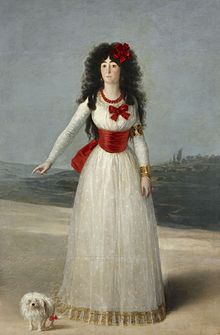Goya (opera)
Goya is an opera by Gian Carlo Menotti . The libretto was written by the composer.
The opera, based on the life of the famous Spanish painter Francisco de Goya , was commissioned by the Spanish tenor Plácido Domingo , who Menotti suggested in 1977. The opera was premiered in Washington, DC in 1986 and adapted to Domingo's current vocal range for a series of performances in Vienna in the summer of 2004.
action

Left alone and deaf, Goya lived at the end of his life in Bordeaux . It seems to him that he has not lived his life properly. In order to dispel these doubts, he recalls the most important scenes of his life.
As a young man in Madrid, he fell in love with a maid in a tavern. He mouths his mouth full and claims that in a short time he will be the greatest painter in Spain. The next day he lets him paint her and he realizes that she is actually the Duchess of Alba, one of the most respected aristocrats in Spain. He adores her and falls in love with her.
After the Duchess of Alba has won Goya completely for himself, the king is full of envy and since the Duchess annoys the Queen even more by having her six chambermaids wear a duplicate of the Queen's dress at a ball, the Prime Minister Godoy persuades the painter to himself to show solidarity with the king, to be loyal to the ruler. Goya lets himself be persuaded and so the Duchess leaves him because of his indulgence.
Goya now realizes that he was the victim of the power struggle between the Queen and the Duchess, he loses his hearing and withdraws.
After the Queen had Alba poisoned, she was dying and wanted to see Goya one last time. He cannot come in time and after her death he believes that he did not live properly because he did nothing about the grievances in society and only painted his pictures.
Alba appears to him at the last moment; she tells him that his life and his pictures have served a higher purpose. Goya dies.
Web links
- Goya in the catalog of the German Music Archive